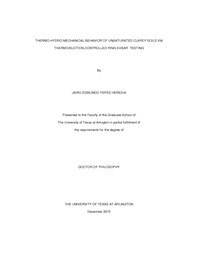| dc.description.abstract | There is a lot of geotechnical infrastructure made of compacted soil, or resting on unsaturated ground, which involves a wide range of deformations. Calculation of foundation settlement, for instance, requires a good estimation of soil stiffness at relatively small strains. Analysis of natural and engineered earth slopes, embankments, and soil bearing capacity, on the other hand, requires good estimations of shear strength, from peak to residual.
Besides, despite the critical importance of the thermo-mechanical behavior of unsaturated soils in many geotechnical applications, the effect of relatively high temperature on shear strength and stiffness properties of unsaturated soils is not yet well understood, as thermo-mechanical testing of soils is more complex than conventional isothermal testing. Thermally induced changes in shear strength and stiffness properties of surrounding soils may have a significant impact on key design parameters.
To date, however, there is hardly any comprehensive study at the laboratory scale that has focused on a thorough characterization of shear strength and stiffness behavior of unsaturated soils, controlling temperature and suction at the same time. This type of research, though crucially needed as justified above, has been deterred in the past by the lack of suitable testing tools and techniques. It is precisely in this context that a fully servo/thermo/suction-controlled ring shear play a fundamental role in the thorough characterization of this type of materials. The lack of experimental evidence of this kind has been the chief motivation for this research work.
In this work, a novel suction-controlled ring shear apparatus was enhanced and upgraded to investigate the thermo-hydro-mechanical behavior of unsaturated soils under large and small deformations respectively, including peak and residual shear strength response, and dynamic properties. A series of tests were conducted on both devices controlling suction and temperature at the same time.
In terms of the strength behavior of the soil, it was confirmed that the higher the suction, the higher the strength of the soil, both peak and residual, and the higher the net stress, the higher the shear strength. In terms of the shear strain behavior of the soil, the increase in suction generated an increase in the shear modulus. Also, an increase in net stress, also resulted in a shear modulus increase.
Regarding the temperature, it was demonstrated that at higher temperatures than the average (20°C), the shear strength of the soil depends on the net normal stress applied and the failure surface was found in a depth close to the middle point of the height of the sample. | |


